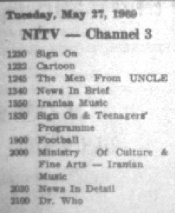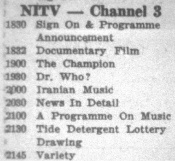Difference between revisions of "Iran"
Jon Preddle (talk | contribs) |
Jon Preddle (talk | contribs) |
||
| Line 135: | Line 135: | ||
As a curiosity piece, we have imaged here (above) a copy of TV listings in Farsi (which, like [[Arabic]], reads from right to left). While this does not included '''Doctor Who''', see if you can work out which is the listing for Gerry Anderson's puppet-series, '''Captain Scarlet'''! | As a curiosity piece, we have imaged here (above) a copy of TV listings in Farsi (which, like [[Arabic]], reads from right to left). While this does not included '''Doctor Who''', see if you can work out which is the listing for Gerry Anderson's puppet-series, '''Captain Scarlet'''! | ||
| + | |||
. | . | ||
| Line 141: | Line 142: | ||
. | . | ||
| + | |||
| + | |||
| + | ==Iran / Persia in Doctor Who== | ||
| + | * Barbara says he feels like "Scheherezade", the teller of the Arabian Nights ([[The Crusaders]]). | ||
| + | |||
Revision as of 03:22, 31 January 2011
IRAN is an Islamic Republic (formally known as Persia); it nestles between the Persian Gulf (Middle East) and the Asian continent.
Profile
| Country Number (28?) | 1969 | FIRST WAVE |
| Region | Middle East | |
| Television commenced | 1966 | |
| Colour System | 1973 | SECAM |
| Population | 1966 | 22.5 million |
| TV Sets | 1966 | 100,250 |
| Language/s | Farsi | Dubbed |
Television Stations / Channels
Iran began its television service in 1966. To begin with, there was one commercial television broadcaster: Television of Iran, which operated through Channel 3.
By 1969, this had become National Iranian Radio & Television (NIRTV), which operated Channels 3 and 7 & 9.
Doctor Who aired on Channel 3.
A second broadcaster was AFRTS, which was a US Air Force station; this was AFTV-Channel 8.
Colour transmissions began on NITV in 1973 using the SECAM colour broadcast system.
Language/s
The official language of Iran is Farsi. English is also recognised as a secondary language. All television is dubbed into Farsi. (It is a possibility that some programming was simulcast in English.)
DOCTOR WHO IN IRAN
Iran was the 28th country to screen Doctor Who. It was the fourth in the greater Middle East region (see Selling Doctor Who).
BBC Records
On 20 October 1967, the NZBC (New Zealand) sent episodes one and two of Marco Polo to Iran. These must have been supplied as "audition" prints (see Selling Doctor Who for more on these types of prints). Although Marco Polo was not included in the package of William Hartnell stories offered to non-English language countries (e.g. Arabic, Spanish), Iran must have considered Doctor Who a worthy purchase...
The Seventies records a sale of "(7)" stories by 28 February 1977. The Handbook identifies these as being: C, F, G, J, N, Q and R.
In DWM, Iran is identified in 8 story Archives: the same as above, plus L.
Although there are only eight stories officially recorded, Iran appears to have purchased the standard package of twelve stories, 56 episodes that were supplied to non-English speaking countries (such as with Arabic and Spanish):
Stories bought and broadcast
WILLIAM HARTNELL
Twelve stories, 56 episodes:
| A | An Unearthly Child | 4 |
| B | The Daleks | 7 |
| C | Inside the Spaceship | 2 |
| E | The Keys of Marinus | 6 |
| F | The Aztecs | 4 |
| G | The Sensorites | 6 |
| J | Planet of Giants | 3 |
| K | The Dalek Invasion of Earth | 6 |
| N | The Web Planet | 6 |
| P | The Crusade | 4 |
| Q | The Space Museum | 4 |
| R | The Chase | 6 |
Iran therefore bought GROUP A, B, C, D and E (but minus the four historicals) of the standard non-English package of William Hartnell stories.
The programme was supplied as 16mm black and white film prints.
Transmission
WILLIAM HARTNELL
Doctor Who aired on Channel 3.
Only 21 listings for Doctor Who have been identified between 27 May and 21 October 1969 (there was no episode on 5 August due to it being Constitutional Revolution Day).
The start time was variable, with the first six (recorded) episodes at 9.00pm, then 7.30pm for the remaining 15 episodes.
It's not known whether this run of 21 is the beginning, the middle or the end of the series. However, the only combinations of consecutive stories that could make up 21 is: F (4), G (6), J (3), K (6), and L (2); or J (3), K (6), L (2), N (6), Q (4); that is assuming, of course, that the stories aired in the correct order!
The remaining 35 episodes aired before and/or after these 21 – and possibly even in several blocks covering several months; but the papers did not always have billings for Channel 3.
There is no record that Iran screened Doctor Who again, even after the switch to colour in 1973.
Fate of the Prints
Since Iran did its own dubbing into Farsi, it could have been supplied with prints that were in English or had just music and effects. It is unlikely that it sent these prints anywhere else.
- In 1984, when Ian Levine spent hours telephoning foreign television stations in the search for missing episodes, he rang an Iranian TV station asking if they had any episodes of Doctor Who; the reply he got back was:" "In the name of Allah, what are you talking about?"
TV listings
| ← AIRDATES ...... (CLICK ICON TO GO TO TABLE SHOWING EPISODE BREAKDOWN AND AIRDATES - N/S = story title is Not Stated) |
TV listings have been obtained from the Iranian English-language newspaper The Kayhan (International Edition) and Tehran Journal. Most of the Journal's listings for the Doctor Who timeslot say "FILM".
The first few listings give the title as "Dr Who", then "Dr Who?", compete with question mark.
Prior to 27 May 1969, the paper did not always have listings for Channel 3, or the timeslot that Doctor Who occupied was simply marked with "To Be Announced".
There are 35 episodes unaccounted for.
As a curiosity piece, we have imaged here (above) a copy of TV listings in Farsi (which, like Arabic, reads from right to left). While this does not included Doctor Who, see if you can work out which is the listing for Gerry Anderson's puppet-series, Captain Scarlet!
.
.
.
Iran / Persia in Doctor Who
- Barbara says he feels like "Scheherezade", the teller of the Arabian Nights (The Crusaders).



